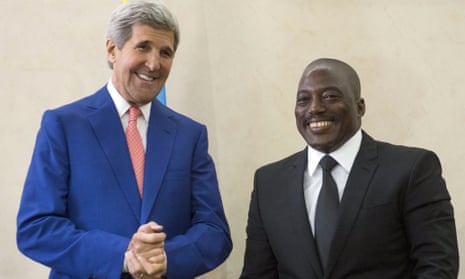The United States is prepared to give the Democratic Republic of Congo $30m ($18m) in aid for stability and democracy-building but wants President Joseph Kabila to agree to step down at the end of his current term in office, the secretary of state, John Kerry, said on Sunday.
Kerry, who is on an African tour, said Congo's government also needs to schedule elections soon. The vote is tentatively set for 2016, although a firm date has not yet been set.
In a private meeting, Kerry said he urged Kabila to follow Congo's constitution in the upcoming elections, which would prohibit him from running for a third consecutive term as president. It was not clear if Kabila agreed. Kerry also said he urged Kabila to lift a freeze on international adoptions of Congolese orphans.
"It is important to the people to be able to know what the process is, to have confidence in that process," Kerry told reporters after the meeting. "The sooner the process is announced, the sooner that the date is set, the sooner people have an ability to be able to participate. And we believe it ought to be done in keeping with the constitutional process of the country."
The $30m pledge would more than double the $12m in assistance given to Congo last year linked to elections and stability assistance. Some of the money could go to non-governmental organisations. Last year, total US aid to Congo was about $210m.
The funding would help further stability efforts in Congo, which has been racked by violence for two decades. Kerry said more must be done to combat Congo-based rebels, the Democratic Forces for the Liberation of Rwanda, known by its French acronym, FDLR, whose members are accused of perpetrating the 1994 genocide in neighbouring Rwanda.
Aside from the upcoming elections, Kerry noted continued challenges in Congo's fight against several rebel groups. He commended government and United Nations security forces for last year's defeat and disbanding of the M23 rebel group but said efforts to disarm, demobilise and reintegrate fighters from other opposition groups into society "are the priorities of the moment”.
"I need to be clear: military force alone will not deliver stability to the Democratic Republic of Congo," Kerry said. "Lasting peace will not grow out of the barrel of a gun."
Most of Congo's violence has been limited in recent years to the country's eastern borders with Uganda and Rwanda.
The FDLR is viewed by analysts as the greatest remaining menace in eastern Congo. The group is led by Rwandan Hutus who helped commit the 1994 genocide and later escaped over the border. The presence of the FDLR has prompted Rwanda to invade Congo twice before to try to wipe out the group.
Additionally, Congo's government is grappling with the Allied Democratic Forces, a group of Islamist rebels that is led by Ugandan commanders. Experts believe the group begins military training for girls as young as 15 and boys as young as 10.

Comments (…)
Sign in or create your Guardian account to join the discussion